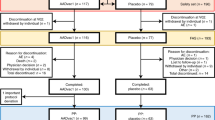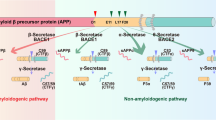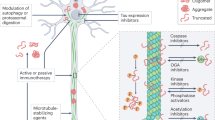Abstract
The agents that are available at present for the management of Alzheimer's disease treat only the symptoms of neurodegeneration and, at best, result in modest, short-term improvements in cognitive function. Immunotherapy represents one of the first tests of the amyloid hypothesis in the clinic, and is an evolving approach to the treatment of Alzheimer's disease that offers a genuine opportunity to modify disease progression. Although initial clinical trials of one approach met with some setbacks, active or passive immunization holds great potential for treating or even preventing Alzheimer's disease.
This is a preview of subscription content, access via your institution
Access options
Subscribe to this journal
Receive 12 print issues and online access
$189.00 per year
only $15.75 per issue
Buy this article
- Purchase on Springer Link
- Instant access to full article PDF
Prices may be subject to local taxes which are calculated during checkout
Similar content being viewed by others
References
Senior, K. Dosing in phase II trial of Alzheimer's vaccine suspended. Lancet Neurol. 1, 3 (2002).
Tanzi, R. E. et al. The gene defects responsible for familial Alzheimer's disease. Neurobiol. Dis. 3, 159–168 (1996).
Hardy, J. New insights into the genetics of Alzheimer's disease. Ann. Med. 28, 255–258 (1996).
Citron, M. et al. Mutation of the β-amyloid precursor protein in familial Alzheimer's disease increases β-protein production. Nature 360, 672–674 (1992).
Citron, M. et al. Mutant presenilins of Alzheimer's disease increase production of 42 residue amyloid β-protein in both transfected cells and transgenic mice. Nature Med. 3, 67–72 (1997).
Suzuki, N. et al. An increased percentage of long amyloid β protein secreted by familial amyloid β protein precursor (β APP717) mutants. Science 264, 1336–1340 (1994).
Borchelt, D. R. et al. Familial Alzheimer's disease-linked presenilin I variants elevate Aβ1–42/1–40 ratio in vitro and in vivo. Neuron 17, 1005–1013 (1996).
Scheuner, D. et al. Secreted amyloid β-protein similar to that in the senile plaques of Alzheimer's disease is increased in vivo by the presenilin 1 and 2 and APP mutations linked to familial Alzheimer's disease. Nature Med. 2, 864–870 (1996).
Schenk D. et al. Immunization with amyloid-β attenuates Alzheimer-disease-like pathology in the PDAPP mouse. Nature 400, 173–177 (1999).
Janus, C. et al. A β peptide immunization reduces behavioural impairment and plaques in a model of Alzheimer's disease. Nature 408, 979–982 (2000).
Morgan, D. et al. A β peptide vaccination prevents memory loss in an animal model of Alzheimer's disease. Nature 408, 982–985 (2000).
Sigurdsson, E. M., Scholtzova, H., Mehta, P. D., Frangione, B. & Wisniewski, T. Immunization with a non-toxic/nonfibrillar amyloid-β homologous peptide reduces Alzheimer's disease-associated pathology in transgenic mice. Am. J. Pathol. 159, 439–447 (2001).
Bard, F. et al. Peripherally administered antibodies against amyloid β-peptide enter the central nervous system and reduce pathology in a mouse model of Alzheimer's disease. Nature Med. 6, 916–919 (2000).
DeMattos, R. B. et al. Peripheral anti-Aβ antibody alters CNS and plasma Aβ clearance and decreases brain Aβ burden in a mouse model of Alzheimer's disease. Proc. Natl Acad. Sci. USA 98, 8850–8855 (2001).
DeMattos, R. B., Bales, K. R., Cummins, D. J., Paul, S. M. & Holtzman, D. M. Brain to plasma amyloid-β efflux: a measure of brain amyloid burden in a mouse model of Alzheimer's disease. Science 295, 2264–2267 (2002).
Dodart, J. C. et al. Immunization reverses memory deficits without reducing brain Aβ burden in Alzheimer's disease model. Nature Neurosci. 5, 452–457 (2002).
Solomon, B., Koppel, R., Hanan, E. & Katzav, T. Monoclonal antibodies inhibit in vitro fibrillar aggregation of the Alzheimer β-amyloid peptide. Proc. Natl Acad. Sci. USA 93, 452–455 (1996).
Solomon, B., Koppel, R., Frenkel, D. & Hanan-Aharon, E. Disaggregation of Alzheimer β-amyloid by site-directed mAb. Proc. Natl Acad. Sci. USA 94, 4109–4112 (1997).
Bacskai, B. et al. Non-Fc mediated mechanisms are involved in clearance of amyloid-β in vivo by immunotherapy. J. Neurosci. 22, 7862–7872 (2002).
Frenkel, D., Katz, O. & Solomon, B. Immunization against Alzheimer's β-amyloid plaques via EFRH phage administration. Proc. Natl Acad. Sci. USA 97, 11455–11459 (2000).
Lopez, J. C. The comeback of immunization. Nature Rev. Neurosci. 3, 330 (2002).
Hock, C. Vaccination therapy for Alzheimer's disease. Neurobiol. Aging 23, S143 (2002).
Monsonego, A. et al. Immunogenic aspects of amyloid β-peptide: implications for pathogenesis and treatment of Alzheimer's disease Neurobiol. Aging 23, S112 (2002).
Acknowledgements
I thank J. Callaway, M. Koller, R. Black and C. Gombar for careful reading of the manuscript. I would also like to acknowledge the many contributions of my other colleagues at Elan and Wyeth to many aspects of the Aβ immunotherapeutic efforts.
Author information
Authors and Affiliations
Related links
Related links
DATABASES
LocusLink
OMIM
FURTHER INFORMATION
Encyclopedia of Life Sciences
Rights and permissions
About this article
Cite this article
Schenk, D. Amyloid-β immunotherapy for Alzheimer's disease: the end of the beginning. Nat Rev Neurosci 3, 824–828 (2002). https://doi.org/10.1038/nrn938
Issue Date:
DOI: https://doi.org/10.1038/nrn938
This article is cited by
-
The apoptotic effects of NK-92 cells stimulated with an anti-CD226 antibody on MDA-MB-231 triple-negative breast cancer cells
Medical Oncology (2023)
-
Vascular Considerations for Amyloid Immunotherapy
Current Neurology and Neuroscience Reports (2022)
-
Evaluation of a DNA Aβ42 vaccine in adult rhesus monkeys (Macaca mulatta): antibody kinetics and immune profile after intradermal immunization with full-length DNA Aβ42 trimer
Alzheimer's Research & Therapy (2017)
-
Co-immunization with DNA and protein mixture: A safe and efficacious immunotherapeutic strategy for Alzheimer's disease in PDAPP mice
Scientific Reports (2015)



